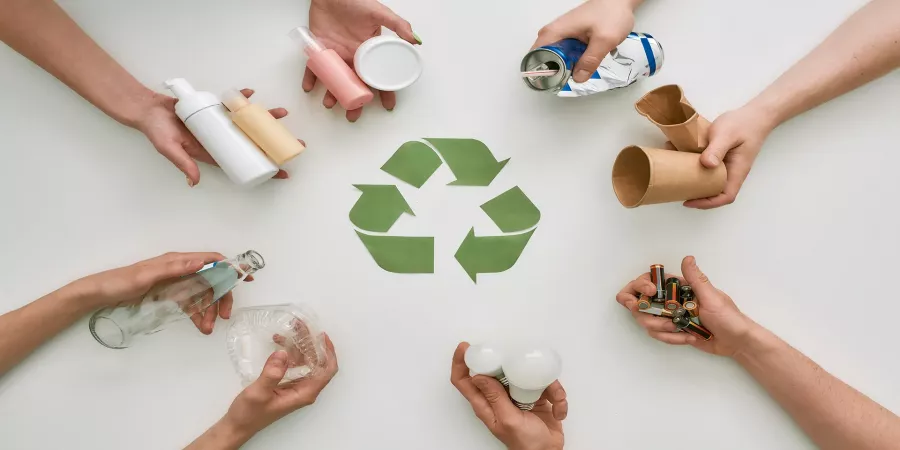How to properly recycle in your home and city: A guide for Serbian citizens

Recycling is a key process in preserving the environment, and while governments and larger communities must address this issue, a significant responsibility lies with the citizens. In Serbia, despite challenges and a lack of education on the subject, citizens have opportunities to contribute to waste reduction and environmental protection. This guide reveals some of the basics when it comes to recycling and offers practical advice on handling different types of waste.
What is recycling and why is it worth the effort?
Recycling involves collecting, separating, processing, and creating new products from used materials. It is one of the most important activities we can undertake to reduce pollution on our planet and within our communities. The goal is to decrease the amount of waste sent to landfills and to turn some used items into new products. The global community takes this issue very seriously, as recycling is a crucial step in reducing methane emissions, one of the most potent greenhouse gases.
This text will answer the following questions:
- What can and cannot be recycled?
- Where to take waste for recycling?
- How to reduce the amount of waste in your environment?
What can be recycled, and what cannot?
To make the process efficient, it is necessary first to separate waste by type. Many waste materials can be reused if collected separately. Sorting waste requires some knowledge of the properties of items, so learn which materials are suitable for recycling and which are not.
Materials for recycling:
Paper, glass, cardboard, and metal are easily recyclable, as is plastic. The latter is the subject of many discussions. It is estimated that plastic takes several hundred years to decompose completely. Almost all plastic can be recycled, although this practice is not at a desirable level. Globally, around 10% of plastic bottles are recycled, while the remaining 90% end up in landfills or natural waters.
Furthermore, paper and cardboard represent the largest quantity of recyclable materials. The downside of paper production is the necessity of cutting down many trees, which are crucial for air filtration and temperature regulation on our planet. Therefore, it is even more important to handle paper recycling conscientiously.
The recycling of electrical and electronic equipment that is no longer in use is particularly important. These devices have the characteristics of hazardous waste and should not be mixed with other trash. Components can be reused in the production of new devices. Learn exactly what to do with each type of waste in the continuation of this text.
Cannot be recycled:
Unfortunately, this category includes many everyday items, such as diapers, laminated paper, adhesive tapes, carbon paper, photographs, and photo paper, greasy and dirty paper and cardboard, paper tissues, toilet paper, and hand towels.
Additionally, empty cans from meat products, fruits, and vegetables, wires, metal caps, spray paint, and lacquer cans are not suitable for recycling. Glass is favorable for recycling when it comes to glass bottles and jars, but mirrors and standard light bulbs cannot be recycled, except for eco-friendly ones. Textiles are almost always reusable, regardless of the material, except in cases of heavy contamination from container waste. This is another reason why waste should be carefully sorted.
All recycling places in Serbia!
Two years ago, the "WHERE TO RECYCLE" initiative was launched, providing a comprehensive database of recycling sites in various cities and municipalities across Serbia. It is presented as an interactive map, easily accessible online. On the website, you can search for the nearest recycling site for a specific type of waste by entering the location and choosing the waste you want to dispose of. In this way, you can find the nearest recycling places with just a few clicks at any time. This is a significant step, as there is a great interest in recycling in Serbia, but providing citizens with adequate information is necessary. The interactive map is regularly updated with locations from municipalities and cities across Serbia that are introducing their initiatives.
"Reduce, reuse, recycle" for a sustainable lifestyle
In a broader sense, recycling includes everything that can be reused instead of being thrown away. Recycling can be practiced in everyday life. For example, donating items that are no longer used is a form of recycling. To reduce the amount of waste in your environment and move towards "Zero Waste" principles, there are several steps you can easily and immediately take.
First and foremost, invest in reusable products such as glass bottles instead of plastic ones, cloth bags instead of single-use ones. You can consider buying bulk products to reduce packaging waste, and use glass jars or containers you already have at home for food storage. Using multipurpose cloth napkins instead of paper towels can also significantly reduce household waste. When shopping, choose products with minimal or biodegradable packaging and avoid single-use plastic products like straws, cutlery, and plates. Composting organic food waste is another way to reduce the amount of waste that ends up in landfills.
Through these simple changes in daily habits, everyone can contribute to preserving the environment. Every positive step creates a chain reaction of change; don't forget that! City Expert is with you on this journey, and through such topics, we aim to bring useful concepts and practices closer to a wider audience. We recommend reading our recent article on maintaining a healthy environment in your home.


